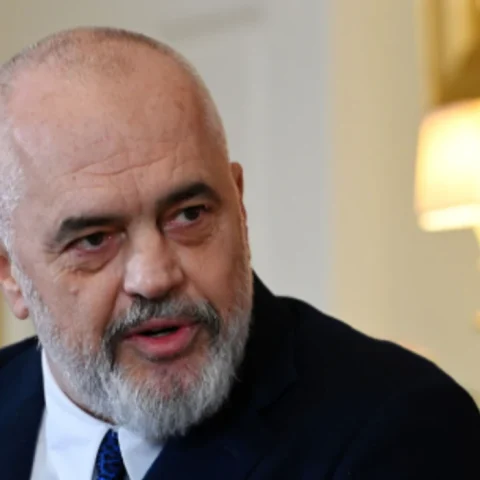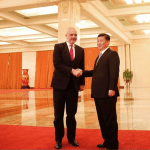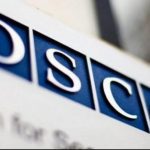The UN has recognized the Srebrenica massacre as genocide by a majority vote. With this decision, the international community gives a warning signal against any form of genocide. And the role of Mrs. Del Ponte for hiding the truth.
By SYLË UKSHINI*
On May 23, the United Nations General Assembly approved a resolution declaring July 11 as the International Day of Remembrance for the Victims of the Srebrenica Genocide. This resolution, co-sponsored by Germany and Rwanda, was adopted with 84 votes in favor, 19 against, and 68 abstentions. This marks a significant victory for the Bosnian civilian victims in Bosnia-Herzegovina and strongly supports the ongoing efforts to locate, identify, and properly bury the remaining victims of the Srebrenica genocide. With this resolution, the UN formally acknowledges the Srebrenica massacre as genocide. In July 1995, Bosnian Serb military units, led by Ratko Mladic, took control of Srebrenica, which the UN Security Council had designated a protected area in 1993. The massacre of over 8,000 Bosnian men and boys by Serb forces in this region of Bosnia and Herzegovina stands as one of the most egregious failures of the UN, with Dutch UN troops surrendering without resistance.
This resolution urges continued efforts to prosecute the perpetrators of the Srebrenica genocide who have not yet been brought to justice. It calls on all states to fully adhere to their obligations under the Convention on the Prevention and Punishment of the Crime of Genocide and customary international law concerning the prevention and punishment of genocide, taking into account the decisions of the International Court of Justice.
This resolution urges continued efforts to prosecute the perpetrators of the SrebrWith this resolution, the international community issues a strong warning against any form of genocide. By condemning the denial of the Srebrenica genocide, the General Assembly has laid the groundwork for developing educational programs to prevent future acts of genocide. This resolution helps preserve the memory of the genocide in the Balkans and ensures that any attempts to minimize, distort, or deny the historical facts will be firmly opposed. The UNGA has sent a powerful message against denying or distorting the facts surrounding one of the most heinous crimes against humanity in Bosnia and Herzegovina, where over 8,000 innocent people were killed. It calls on all states to fully adhere to their obligations under the Convention on the Prevention and Punishment of the Crime of Genocide and customary international law concerning the prevention and punishment of genocide, taking into account the decisions of the International Court of Justice.
Since 2003, when the United Nations General Assembly adopted a resolution declaring April 7 as the International Day of Reflection on the Genocide in Rwanda, the resolution on Srebrenica will now serve as a guide for new global policy. This resolution can also be a turning point for future leaders of Serbia and the Republika Srpska in Bosnia-Herzegovina in confronting the truth and addressing the crimes committed during the 1990s.
Although this resolution was not directed at Serbia, a member of the UN, Serbian President
Serbian President Aleksander Vučić had been lobbying against the resolution’s adoption for many weeks. The fact that this resolution specifically targets the perpetrators of the genocide indicates that Vučić’s rhetoric is actually an attempt to protect himself and the politics he was involved in during the 90s. At that time, he served as the Minister of Information in the Milosevic Government and was a member of the Serbian Radical Party, which openly pursued ambitions for a “Greater Serbia.”
“You kill one Serb, and we will kill 100 Muslims,” was his infamous statement made just days after the genocide of Srebrenica. It is no coincidence that Vučić has since normalized all criminals convicted by The Hague for crimes committed in Kosovo, Croatia, and Bosnia-Herzegovina. Consequently, both Republika Srpska and Serbia deny that the crimes in Srebrenica constituted genocide. In 2010, Serbia’s parliament condemned the Srebrenica massacre without using the term “genocide.” The current UN resolution is seen as an attack on Serbia and the Serbs as a nation, even though the resolution does not mention them at all.
In this context, the policies pursued by Vučić and Dodik today mirror those of Milosevic and Radovan Karadzic, who was sentenced to life imprisonment for the Srebrenica genocide. Although these policies do not hold the same power as they did in the 90s—when the peoples of the region were unarmed and Serbia possessed the entire military arsenal of the former Yugoslavia—they remain identical in narrative and ideological terms. Similarly, the threats from Vučić and Dodik to destabilize the region cannot be taken seriously given the current geopolitical circumstances. Following the war in Ukraine and the military aggression in Banjska, Kosovo, NATO has increased its military presence in both Kosovo and Bosnia-Herzegovina.
Against this backdrop, the adoption of the Srebrenica Resolution by the UN General Assembly is unlikely to affect relations between regional countries or the stability of the region as a whole. The real issue is that Serbia’s acceptance of the truth and its inability to overturn the narrative of what happened in Bosnia-Herzegovina and Kosovo with lies causes significant distress. It is now evident that Serbia cannot progress without acknowledging the truth and the war crimes committed. However, such acknowledgment cannot be expected from either Vučić or Dodik, who are the most contaminating remnants of the Milosevic regime in the region.
If the political and intellectual elite in Serbia were truly interested in the country’s future and fostering good neighborly relations with the peoples of the region, they would not be lobbying against the UN resolution declaring July 11 as the International Day of Remembrance of the Genocide in Srebrenica. Vučić’s behavior is particularly shameful because the resolution also calls for “unreserved condemnation of any denial of the genocide in Srebrenica, as well as actions that glorify those convicted of war crimes, including those responsible for genocide.”
In the annals of history and the collective memory of humanity, following the Holocaust and the 2003 resolution on the genocide in Rwanda, this resolution of May 23, 2024, will stand as the strongest and foremost evidence of international condemnation of the Serbian doctrine. This doctrine was conceived by the Academy of Sciences and Arts of Serbia and endorsed by figures such as Milosevic, Karadzic, Mladic, Seselj, and Vučić.
This reaction indicates that Vučić fears international justice may one day come for him, especially after he is no longer the president of Serbia. He is also concerned that such a resolution could bolster Kosovo and Croatia’s ambitions to follow Bosnia’s lead in accusing him of genocide. Although Milosevic managed to avoid a final verdict by exploiting delays and the destructive behavior of Carla del Ponte, the prosecutor at the time for the Hague Tribunal for war crimes in the former Yugoslavia, Serbia itself escaped a genocide charge from the International Court of Justice for Srebrenica.
The Role of Carla del Ponte
Former Chief Prosecutor of the International Criminal Tribunal for the former Yugoslavia (ICTY), Carla del Ponte, along with the ICTY itself, while contributing to the prosecution of war criminals, also share undeniable responsibility for downplaying Serbian crimes in Kosovo, Bosnia-Herzegovina, and Croatia. Del Ponte, in particular, stood out in this regard, compromising the independence and mandate of the Hague Tribunal. In 2003, she entered into a clandestine agreement with Belgrade to conceal archive documents of the Supreme Defense Council (SDC) in Belgrade, thereby preventing public access by Bosnia, Croatia, and the International Court of Justice (ICJ) for a potential genocide lawsuit against Serbia.
This agreement, signed by then Foreign Minister of Serbia, Goran Svilanović, and The Hague judges in 2003, aimed to avoid condemning Serbia for genocide in the Bosnian and Croatian wars. This compromise was the most egregious instance of international justice yielding to injustice and a grave injustice to all victims of Serbian state aggression. It’s noteworthy that even in the trials against Milosevic and in the Kosovo case, the issue of the Serbian plan for the extermination and deportation of Albanians in 1998-99, known as “Plan Horseshoe” (“Plani Patkoi” in Albanian), was deliberately sidelined.
The international community appeared satisfied solely with the ousting of Milosevic and showed limited interest in holding accountable all responsible parties for the crimes and conflicts across the former Yugoslavia. Even after Milosevic was extradited to the Hague Tribunal on charges of war crimes, the new Serbian leadership, touted as “European-oriented” in the West, was adamant about concealing secret documents detailing Serbia’s and the Milosevic regime’s atrocities in Croatia, Bosnia, and Kosovo during the 1990s. These documents primarily pertained to the Supreme Defense Council (SDC) of the Federal Republic of “Yugoslavia,” comprising Serbia and Montenegro, established on April 28, 1992. The SDC convened seventy-four times between mid-1992 and mid-March 1999, with fifty-seven meetings held during the Bosnian-Herzegovinian war. It was a body that brought together the federal government’s prime minister, the presidents of Serbia and Montenegro, and the army commander, with Milosevic attending all seventy-four sessions.
Geoffrey Nice fought vehemently for a year to obtain the originals of the SDC’s top-level meetings in Belgrade under Milosevic’s remaining Yugoslavia. Despite Belgrade’s obligation to cooperate with the Tribunal, it resisted, as those archives contained clear evidence of Milosevic and the Serbian leadership’s roles in the conflicts in Croatia, Bosnia, and Kosovo.
To break the deadlock towards the end of the accusation phase, Carla del Ponte, in a letter she sent to Serbian-Montenegro Minister of Foreign Affairs Goran Svilanović in early May 2003, agreed not to oppose the non-publication of a portion of the archive, provided that the protective measures requested by Belgrade remained “reasonable” and in line with the Tribunal’s regulations. Somewhat appeased by del Ponte’s letter, Belgrade tentatively agreed by the end of May 2003. An expert from the Tribunal’s Prosecution was permitted to view the selection of the SDC archive, but copying was prohibited; only note-taking was allowed.
In October 2003, Svilanović and his team of lawyers, who were defending the State of Serbia before the Hague Tribunal, were surprised by their victory and feared a potential revision of this decision, which the prosecution contested. Meanwhile, at the request of the Prosecutor’s Office of the Hague Tribunal, on July 30, 2003, the judges reiterated the order for Belgrade to hand over the records.
However, Belgrade immediately opposed this request. Serbia persuaded the judicial panel overseeing the “Milosevic case” to restrict the use of these documents solely to the Milosevic trial and to prohibit their use in public or any other instance outside the Tribunal. Belgrade won this dispute by invoking the “vital national interest” of the Serbian state. However, the regulation stipulated that such measures could only be approved to protect information that might jeopardize the state’s security. The Hague Prosecutor’s Office was unaware of the arguments and motives behind the judicial panel’s decision to keep the Serbian KSM documents secret until January 2004 when they attempted to summon Zoran Liliq, a participant in the SDC meetings, to testify.
As per the Agreement with Svilanović, Belgrade withheld the minutes from certain meetings from the Prosecutor’s Office of the Tribunal. Instead, the Hague Prosecutor’s Office had to rely on the official reports submitted to the SDC archive, which were sometimes incomplete.
Belgrade was determined to avoid a conviction of the Serbian state for genocide at all costs. Such a verdict would entail significant responsibility and financial liabilities for the new government in Belgrade. Even Florence Hartmann, former spokeswoman for the Hague Tribunal, attests that Serbian officials were convinced that the SDC archives could incriminate Serbia for genocide.
Thus, the “vital national interest” of the Serbian state presented before the Tribunal effectively amounted to concealing all evidence that could implicate it before the ICJ. However, the Prosecutor’s Office was perplexed as to why the Tribunal’s judges aided a state in withholding evidence from another international body under the UN. The panel overseeing Milosevic’s case allowed Belgrade to persuade it that punishment from the ICJ would jeopardize Serbia’s international standing and inflict irreparable harm on the state and its economy.
British judge Richard May, Jamaican Patrick Robinson, and South Korean O-Gon Kwon prioritized the perceived stability of the state over the pursuit of justice and truth, thus yielding to the prevailing rhetoric in international reports. In doing so, they became complicit, turning a blind eye to the fact that the “vital national interest” had previously been invoked to justify the very crimes they were now tasked with adjudicating. Five judges of the Court of Appeal rejected the notion that Serbia’s “vital national interest,” aimed at preventing an ICJ conviction for genocide, was acceptable. They deemed the decision of the court overseeing Milosevic’s case in 2003, which equated this interest with “national security” and justified the preservation of protective measures in the SDC archive, as erroneous. Serbia successfully prevented certain parts of the Supreme Defense Council documents from being used as evidence in the ICJ proceedings.
Consequently, the five appellate judges became willing participants in a manipulation orchestrated by the Belgrade authorities, aimed at influencing another judicial body, the ICJ, to make a similar error due to its lack of access to the documents. This risk materialized in 2007, when the ICJ, 14 years after Bosnia filed a lawsuit against Serbia for genocide, asserted that the Serbian state had not directly participated in the events in Srebrenica and simultaneously acquitted Milosevic. In response, the vice president of the court, Jordanian judge Ali-Kasauneh, criticized the ICJ for failing to request access to the SDC documents, which would have undoubtedly facilitated the court’s work. Such access could have established more direct links between Belgrade and the mass graves in Srebrenica, Croatia, and Kosovo, leading to a clearer determination of the legal responsibility of the Milosevic regime for the genocide in Bosnia, Croatia, and Kosovo.
The invocation of the “vital national interest” by Belgrade authorities, affirmed by the Tribunal judges through denying public access to the entire SDC archive, ultimately facilitated the distortion of truth. When Serbia references the archives, it becomes evident that its efforts to safeguard the documents revealing the state’s responsibility have concluded, thus allowing the Serbian doctrine to remain unpunished.
“Democratic” Serbia agreed to Milosevic’s trial solely for individual responsibility, absolving the Serbian state of accountability for war crimes. This distinction implies that while Milosevic committed the crimes, Serbia did not. Milosevic was held responsible solely for failing to prevent genocide under the Geneva Convention on the Prevention and Punishment of the Crime of Genocide (1948). Thus, Svilanovic achieved significant success through the agreement made with the Tribunal judges to restrict public and ICJ access to the secret SDC documents.
However, Del Ponte also pursued a political approach, engaging in dialogue with Serbia’s political leadership, which led to this compromise. As Nevenka Tromp, lecturer in East European Studies at the University of Amsterdam, Netherlands, notes, Del Ponte received direct support from her diplomatic and public relations assistants within the Prosecutor’s Office, who influenced her policies of cooperation. This action led many observers to question the ICTY’s commitment to transparency and justice administration, as well as the rights of victims and the public to access wartime information. Furthermore, the public debate over who benefitted most from this agreement undermined the ICTY’s credibility and primarily favored Serbia.
As a result of direct involvement by Del Ponte, the International Court of Justice ruled in 2007 that Serbia bore neither responsibility nor complicity in the act but acknowledged its failure to prevent it. A significant factor in absolving Serbia of responsibility was the 2003 agreement between the Prosecutor of the Hague Tribunal, Carla del Ponte, and Serbian authorities. Today, the passage of the Resolution—endorsed by 84 countries, opposed by 19, with 68 abstentions—declaring July 11 as the International Day of Remembrance of the Genocide in Srebrenica marks the most significant victory against the Serb doctrine.
However, Hungary, under Orbán’s leadership, stands as the sole European Union country to oppose the Resolution, signaling a need for extensive efforts to rectify this shameful stance. Orbán seems to overlook the fact that Europe has progressed from 1937 to 2024 and upholds vastly different values.
Carla del Ponte cannot be absolved of blame, as she is also considered chiefly responsible for why Milosevic evaded punishment for the crimes in Kosovo. Her approach rendered it impossible to hold the Milosevic regime accountable for its atrocities, spanning from Croatia and Bosnia-Herzegovina to Kosovo. Unlike her Canadian predecessor, Louise Arbour, who indicted Milosevic in May 1999 for grave crimes committed in Izbica, Meja, Reçak, Prekaz, Krushë, Suharekë, and numerous other incidents, as well as the deportation of nearly 80 percent of Kosovo Albanians in May 1999, Del Ponte lacked the will and courage. Arbour’s resolute actions, despite resistance from various Western international centers seeking a political settlement to end the Kosovo war, were historically significant. Belgrade even ridiculed Arbour’s determination when she attempted to investigate the Recak massacre in January 1999. Arbour’s efforts led to Slobodan Milosevic becoming the first president indicted for war crimes, primarily in Kosovo, as she persuaded the judge in The Hague of the substantial evidence linking Milosevic, as the state president, directly to these crimes.
Meanwhile, two additional indictments were lodged against Milosevic: one for Bosnia-Herzegovina and another for Croatia. While it was straightforward to establish that Serbian forces had committed crimes in Croatia and Bosnia-Herzegovina, proving Milosevic’s direct culpability for these offenses was challenging due to their occurrence “outside the territory of Serbia”.
The prolongation of the judicial proceedings was influenced by a clandestine agreement Del Ponte struck with Belgrade to keep sealed Serbian documents that would illuminate the decisions made by Milosevic and Serbian military leaders regarding the wars in Bosnia-Herzegovina and Croatia, further complicating the process. During this protracted period, Milosevic passed away without a verdict being rendered. However, Del Ponte stirred controversy with her book “The Hunt: Me and the War Criminals,” making unfounded allegations against the Kosovo Liberation Army (KLA) regarding the trafficking of organs from slain Serbs and referencing the so-called “yellow house.” This served to further downplay Serbian crimes, creating the impression that all parties in the former Yugoslavia were culpable, thereby perpetuating the Serbian doctrine’s evasion of accountability.
The UN General Assembly’s resolution is a positive initial step that should be followed by the prosecution of crimes, ethnic cleansing, and Serbian genocide in Kosovo, originating from the Memorandum of the Academy of Sciences and Arts of Serbia, as noted by Del Ponte at the onset of Slobodan Milosevic’s trial on February 12, 2002.
In light of this, the adoption of the UN Resolution on the Commemoration of the Victims of the Genocide in Srebrenica should be endorsed and acknowledged by the Assembly of the Republic of Kosovo. Such a move would align Kosovo, which is not yet a UN member, with the states that sponsored and voted for the resolution, acknowledging the Balkan holocaust, one of the most abhorrent events since World War II.
The voting of the Srebrenica resolution underscores a reality that requires deeper understanding Kosovo, in addition to Bosnia and Herzegovina, as they confront Serbia with its historical legacy and necessity for accountability for the wars of the 90s, on the mass killings perpetrated by Belgrade across the region. The passage of the resolution signifies shifts in the geopolitical landscape that extend beyond reckoning with the past. It also holds significance for Kosovo’s journey toward full integration into the international community, including its aspiration for UN membership. However, Serbia and its authoritarian allies are actively obstructing this path, employing various tactics, including manipulation of Western powers, which have chosen to overlook Serbia’s destabilising actions in the region.
This step is imperative because even for Kosovo, the adoption of the resolution commemorating the 1995 Srebrenica genocide serves as a valuable model and a commitment to upholding historical truth, combating revisionist attempts to alter history, ensuring accountability, and combating impunity for crimes committed during the 1998/1999 war.
*The author is a professor of History and International Relations at “Kadri Zeka” University of Gjilan/Kosovo










